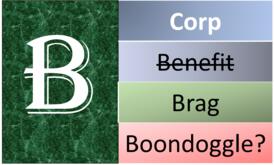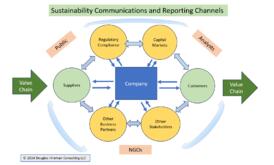
By Douglas Hileman, FSA, CRMA, CPEA
The Los Angeles Times reported on controversies swirling around the “coveted ethical and eco-friendly seal” last month[1]. The article mentioned celebrities and well-meaning companies who are among the 7,800 certified B Corps worldwide. The article highlighted several controversies, including:
- Nespresso is awarded B Corp status, despite poor track record on human rights, including child labor [aside: not to mention over 20 billion plastic pods, the vast majority of which go to landfills[2]].
- Over 30 certified B Corps accuse B Corp of greenwashing.
- B Corp scoring is opaque, and does not consider negative factors.
As insightful as the article is, there is more. The LA Times article cited members as saying B Corp “isn’t a marketing gimmick – it’s a movement.” Douglas Hileman Consulting LLC (DHC) wonders if it’s something else. Is B Corp a benefit, a brag – or a boondoggle?
- “Benefit” it’s not. The LA Times article says “… B Corps – short for ‘benefit corporations’ …” This is not correct, but a common misperception. When companies obtain charters (from states), they must indicate if they are for profit or a non-profit organization. For-profit organizations exist to make money for shareholders – full stop. Non-profit organizations exist for a purpose. At for-profit companies, environmental and social issues were met via regulatory compliance requirements. Many considered budget for Sustainability, social issues, etc. to be “extra” – if not contrary to their state charter. What about companies that wanted to do both? In April 2010, Maryland became the first state to allow companies to register as benefit corporations – a hybrid, if you will. (Read More)
[1] “Nespresso, Dr. Bronner’s and the Battle over B Corp Certification” by Jie Jenny Zou, published in Los Angeles Times, December 13, 2023.
[2] See https://repodder.com/1-the-problem-with-nespresso-coffee-pods#:~:text=In%202022%2C%20it’s%20estimated%20there,than%2070%25%20entering%20global%20landfills., accessed 1/11/2024.
No Tag Found
- April 2024
- March 2024
- February 2024
- January 2024
- December 2023
- October 2023
- September 2023
- July 2023
- April 2023
- March 2023
- October 2022
- September 2022
- April 2022
- November 2021
- October 2021
- July 2021
- June 2021
- March 2021
- February 2021
- January 2021
- December 2020
- July 2020
- January 2020
- October 2019
- September 2019
- July 2019
- June 2019
- May 2019
- March 2019
- January 2019
- October 2018
- June 2018
- March 2018
- December 2017
- August 2017
- June 2017
- May 2017
- March 2017
- February 2017
- January 2017
- December 2016
- November 2016
- October 2016
- August 2016
- July 2016
- June 2016
- May 2016
- April 2016
- March 2016
- January 2016
- December 2015
- October 2015
- November 2012


New Year, new Sustainability Report. Or is it? It’s January, and the scramble to compile a Sustainability report for calendar year 2023 is on. The annual Sustainability report is an important milestone, but it is no longer the only reporting mechanism. In fact, it may not even be the most important or impactful.
Reporting standards and frameworks have proliferated. Some have shifted from voluntary to mandatory, driven by new laws and regulations. Others are “voluntary”, but failure to report or communicate poses risk – for example, losing a customer. Sustainability reporting and communications is no longer a marketing-driven exercise. It’s compliance. It’s embedded into reporting and disclosures to capital markets and business partners. Sustainability reporting and communications now extend to different parties, each with their own needs. Furthermore, reporting and communications are hardly limited to an annual process. Just ask any Chief Sustainability Officer what is in her/his inbox for the last two weeks. The news used to be a daily event, with print newspapers in the morning and a television newscast in the evening. Now we get news via different channels all day long. Sustainability reporting and communications is moving this way. (Read More)
No Tag Found
- April 2024
- March 2024
- February 2024
- January 2024
- December 2023
- October 2023
- September 2023
- July 2023
- April 2023
- March 2023
- October 2022
- September 2022
- April 2022
- November 2021
- October 2021
- July 2021
- June 2021
- March 2021
- February 2021
- January 2021
- December 2020
- July 2020
- January 2020
- October 2019
- September 2019
- July 2019
- June 2019
- May 2019
- March 2019
- January 2019
- October 2018
- June 2018
- March 2018
- December 2017
- August 2017
- June 2017
- May 2017
- March 2017
- February 2017
- January 2017
- December 2016
- November 2016
- October 2016
- August 2016
- July 2016
- June 2016
- May 2016
- April 2016
- March 2016
- January 2016
- December 2015
- October 2015
- November 2012


Compliance Week published an article for premium members outlining factors that contribute to the reporting lines for corporate Compliance functions[1]. This article provided intriguing data from a survey showing how company size and sector align with the reporting relationships of the Compliance function.
Aaron Nicodemus, a respected writer, reached out and generously included a quote as part of the summary. See below.
Consider a company that is seeking to improve its sustainability or pursue environmental, social, and governance goals. The Sustainability Accounting Standards Board (SASB) identifies sustainability topics and their material risks in the short, medium, and long term, said Doug Hileman, a compliance consultant and president of Douglas Hileman Consulting.
“SASB’s approach to materiality aligned with that of financial reporting—it’s all about the risk of impact on financial performance,” he said. “SASB recognized that nonfinancial topics, including regulatory compliance burdens and risks, affect industries differently. Heavily regulated industries will have more, and probably more detailed, disclosure requirements around compliance than less regulated industries (e.g., pharma compared to retail). If compliance requirements pose more material financial risks, the reporting channels and governance structure around compliance might be different.” A company in the energy sector, Hileman said, might see incentives from carbon capture and storage, energy efficiencies, and other benefits to pivot its strategy to improve its financial performance. Read More
No Tag Found
- April 2024
- March 2024
- February 2024
- January 2024
- December 2023
- October 2023
- September 2023
- July 2023
- April 2023
- March 2023
- October 2022
- September 2022
- April 2022
- November 2021
- October 2021
- July 2021
- June 2021
- March 2021
- February 2021
- January 2021
- December 2020
- July 2020
- January 2020
- October 2019
- September 2019
- July 2019
- June 2019
- May 2019
- March 2019
- January 2019
- October 2018
- June 2018
- March 2018
- December 2017
- August 2017
- June 2017
- May 2017
- March 2017
- February 2017
- January 2017
- December 2016
- November 2016
- October 2016
- August 2016
- July 2016
- June 2016
- May 2016
- April 2016
- March 2016
- January 2016
- December 2015
- October 2015
- November 2012





